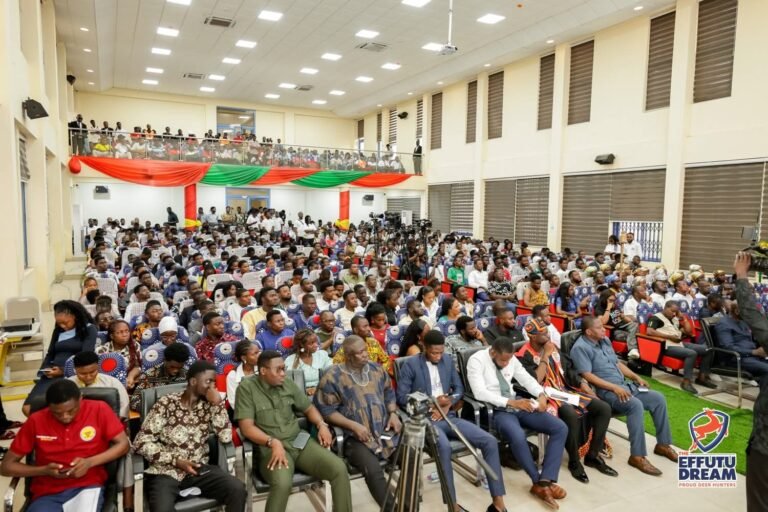
The Secretariat of the National Cathedral Ghana has bemoaned the public debate over the construction of the Cathedral, saying the project deserves a more elevated national conversation regarding its origins, finances and importance.
It noted that since Ghana’s independence, several long-term infrastructure projects had been debated without unbiased cost and long-term value studies. It added, however, that four years into the development of the project, questions persist about the nature of the project, its funding and its relevance to the nation.
Responding to ongoing discussions about the project, the Secretariat, in a statement signed by its Executive Director, Dr. Paul Opoku-Mensah, it noted that the Cathedral is a public project.
“For the avoidance of doubt, the National Cathedral is a National Monument, and, thus, public, not private, project. Legally, the National Cathedral of Ghana is a state-owned company limited by guarantee, and was incorporated under the Companies Act, 1963 (Act 179) on July 18, 2019,” it said.
“We hope this brings to a closure the seemingly vexatious issue of whether the National Cathedral is a private or public initiative. It is however being developed in partnership between the state and the church,” it further clarified.
Disbursements
The Secretariat further explained that, in a bid to ensure that the project does not put undue financial burdens on the state, President Nana Akufo-Addo proposed a partnership between the State and the Ghanaian Christian community, home and in the Diaspora, to develop it.
It clarified that per the partnership, the state was to appoint the architect and design team, provide the land and its preparation, set up and equip the Secretariat, and provide seed money.
“Given the need for the public to understand this partnership, in particular the role of the state, all publications from the Secretariat, including the National Cathedral Update, sent individually to members of Parliament, including this structure and the role of the state. “Seed Money” for the National Cathedral, as part of the role of the state in the project, should therefore be public knowledge,” it stated.
“Following a procurement process approved by the Public Procurement Authority (PPA), and with the input of the Attorney-General, a contract was developed and signed between the office of the President and Sir David Adjaye and Associates in August 2019 for full Architectural and Engineering Services for the project,” it added.
“All the disbursements from the state to the National Cathedral, therefore, have been based on the framework for the state’s participation in the National Cathedral project. And the procurement of services using these funds has all been within legal procurement practices,” it continued.
Portions of the statement disclosed that a fundraising strategy had been developed by the Trustees to operationalise this state-church partnership envisaged by the President. “So funds were raised through Mass Mobilization Strategy (the public), Church Mobilisation (church), Private Sector Strategy (business roundtable) and International Fundraising (diaspora),” it added.
Board of trustees
On the issue of the Board of Trustees, the Secretariat noted that, contrary to claims that the founder of the International Central Gospel Church (ICGC), Pastor Mensa Otabil, resigned from the Board of Trustees of the National Cathedral, he was never a part of the board.
It explained that although Pastor Otabil was appointed as part of the 13-member Board of Trustees, he indicated to the board that he would not be able to give the needed attention to the project, and thus would not want to be registered as a director of the company.
“The Board of Trustees had to be registered as the Directors of the company. A member of the Trustees, Dr. Mensa Otabil, the General Overseer of the International Central Gospel Church, had indicated that he couldn’t give the needed attention to the project so didn’t register. So, Dr. Mensa Otabil did not resign from the Board as being alleged, but excused himself at the point of registration of the Directors in July 2019,” the Secretariat said.
It said Pastor Otabil had therefore not been a member of the Board of Trustees since July 2019, although he “remains actively interested in the project.”
Construction status
Additionally, the Secretariat explained that per the blueprint of the project, the Cathedral has seven levels, two basement levels, and five upper levels making it the highest civic building in Accra.
So far, “the site establishment is completed, a concrete batching plant has been set up in the East Gardens, a Rebar cut and bending yard has been set up, offices, staff canteen, wash-and toilet blocks, warehouses, storages, laydown areas, etc. have been set up.”
“Further establishments items like management, site staff, security, technical equipment and machinery, generators, tools, etc. have been provided by the contractor. – Area of about 70,000 m2 has been cleared,” it added.




